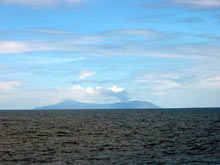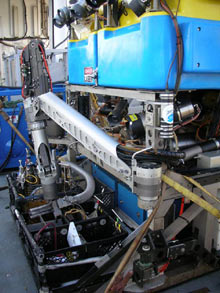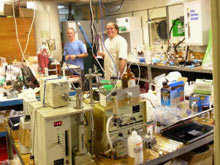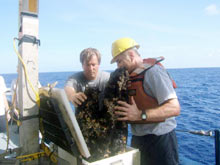More than a week ago, the volcanic island of Anatahan was billowing smoke like an inextinguishable cigar. Click image for larger view and image credit.
The remotely operated vehicle (ROV) Jason has numerous baskets and boxes to safely hold the scientific booty. Click image for larger view and image credit.
Scientists: A Perspective from the Educator at Sea
May 9, 2006
Lori Savage
Educator at Sea
Rogue Community College Instructor
Melville Gazette job posting: Research Scientist
Must be willing to work grueling hours. Excellent
problem-solving skills and a level head are necessary. Must be highly organized
and unconcerned with tedium. Job may require getting dirty at times.
Must be skilled in sales. Good math and computer skills a must. Salary
fluctuates, mostly commission.
More than a week ago, the volcanic island of Anatahan was billowing smoke like an inextinguishable cigar. It was an intriguing sight, but our interests on this expedition have been below the sea surface. Each of the seamounts holds its own scientific booty. The remotely operated vehicle (ROV) Jason hovers and crawls like a predator in search of its prey over numerous features on these submarine volcanoes. Successfully, he collects a multitude of samples: geological (rocks and chimneys), biological (snails, barnacles, mussels, flatfish and microbial mat), and chemical (gas and water).
During the Jason dives, one lasting as long as 28 hrs, each scientist waits patiently for the right conditions and their turn to direct the sampling. Often their entire 4-hr watch will pass without a chance to sample, because Jason was not in their sampling area, or others were sampling, or Medea was repositioning. They endure all of this, only to be called back later to do their specific sampling, and then called again at 4 am to deal with their samples because Jason is "coming up."
Bleary eyed but with great anticipation they stumble onto the flood-lamp-lit deck to await the retrieval of their treasures. Knowing that each sample will require extensive time-consuming evaluation — and, dare I say, monotonous testing and retesting back in the lab — doesn't even factor into this moment. "What do we really have in our baskets, our biobox, the cylinders, Niskin bottles, and gas tights on Jason tonight? What discovery will we have made?"
Would you want a career like this? If you are passionate about a subject, I would hope that your answer would be yes. It seems to me that this passionate career path is similar to a mature love relationship, in which you may fall head-over-heels into it at first, but then somewhere along the line you make a conscious decision that this is worth your time and commitment. (Just in time to convince others it is worth their time and money to sponsor your research.)
As an instructor, I have found that this experience at sea has me pondering the teaching methods of the day. Are we, as educators, focused on the right things? Are we steering away from "edu-tainment," "keeping their interest," or simply babysitting? Are we doing all that we can to spark the fires that lead to curious, passionate people? People who want to pursue answers to questions that others have yet to think of? I hope so – because it seems to me that this is how we will keep on the forefront of science and technology. This is how we'll ebb suffering in our world while explaining the unknowns.
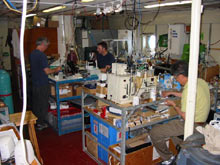
Would you want a career like this? Chemists work long hours in the lab after a water sampling dive. Here we see (from left) Dave Butterfield, Nathan Buck, and Boku Takano. Click image for larger view and image credit.
Chemists work long hours in the research vessel Melville lab after a water-sampling dive by the ROV Jason II.
![]() Click image for larger panorama view QTVR
Click image for larger panorama view QTVR
With eyes twinkling, Verena Tunnicliffe states, "I'm almost certain this amphioxus is a new species." Sheryl Bolton exclaims, "Look how this microbial sample from the sulfide water has taken off!" And speaking more rapidly than usual Cornel de Ronde says, "Look at the layers of chalcopyrite next to the hematite in this chimney. . . . We've not seen that before!"
Research science: Tedious? At times. Complications? Always. Get rich quick? Not likely. Worth it? Definitely.
Sign up for the Ocean Explorer E-mail Update List.




























